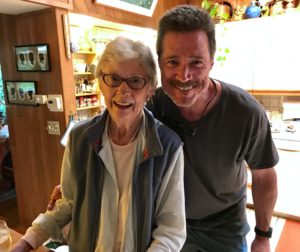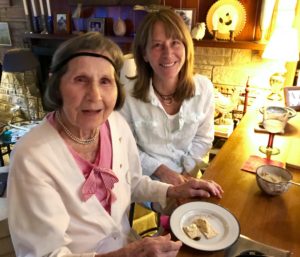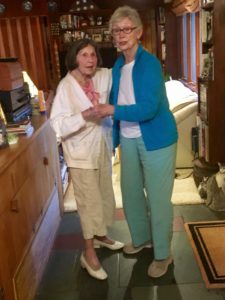Elderly Parents Travel: Consoling Others in Times of Loss Elderly Parents How to Be a Good Traveler How to Deal with Grief Reunions Travel
by maribeth
1 comment
Travel, Grief and Reunions

Mom’s Ratatouille: the Best Kind of Comfort Food
As many Americans hit the road this holiday weekend, it’s good to remember that not everyone you encounter is traveling for pleasure. Despite the sea of shorts, flip flops and skimpy T-shirts, not everyone is headed for summertime fun. Travel encompasses a flood of circumstances and situations, complexities that compound the stress of hitting the road in a multitude of ways.
This is fresh in my mind because just a week ago I scrambled to move up an established departure date to the east coast (from Colorado) by four days. Within twenty-four hours, I had to make the changes to my travel arrangements, which included rescheduling the flight (for me and my cat), my ride to the airport–a one-and-a-half-hour drive–as well as my pick up, my hotel stay the night before and packing and organizing for a three-and-a-half-week stay, all of which needed to be accomplished while under a certain amount of duress. Phew! It was hectic. I even had to work in a veterinary visit in order for my kitty to obtain a current health certificate for his travels.
It was worth it though, since this change allowed me to be home in time for the funeral of my uncle.
Oops, did I catch you off guard?
I often say that if you want to create an awkward moment in a conversation, bring up death and dying.
Well, I hope you’ll read on because death and dying are a part of life. And as I become older, it seems as though I have to face this more and more. And no matter how old someone is, the loss of this person still brings up a heap of emotions. Since I have learned of the passing of a loved one from afar numerous times and then have had to pull it together for a long flight home, I’d like to share with you some tips that might help to console you or a loved one during such tender times.

My Mom and My Brother David this Past Week During Our Reunion
–Step in and make someone’s travel arrangements for them. My brother, David, did this for me when my father passed away and it helped me immensely. Honestly, my mind was so jumbled that I didn’t have my wits about me to book a flight home.
–Go help someone pack when they’re faced with a sudden loss that requires them to travel to the services. I didn’t have anyone with me when I packed for my father’s funeral, however, my cousin, Lisa, was very present from afar. She emailed me old family photos throughout the afternoon when I was pulling it together, a kind gesture that helped to center me and made me feel less alone.
–Try to do as much listening as possible. My boyfriend allowed me to talk and cry out my emotions before I actually got on the plane and has continued to do so ever since. Processing feelings is an important part of grieving and having someone to listen to you helps to make that possible.
–Accompany someone to their place of departure and or be there to pick them up when they arrive. (This is a good metaphor for life and death in fact.)
–Allow people to reminisce to their heart’s content. Reminiscing helps you to process the loved one’s passing and also helps you to bring them back to life (in a sense). Many people feel awkward bringing up the name of a loved one that has passed, often because they’re fearful that that might make the person sad. Even if tears are shed, it’s better that that person be remembered rather than forgotten. You don’t want a loved one to fall into an abyss.
–Usually the reminiscing component is multiplied when family and friends gather to say goodbye to a loved one. This is when some of the biggest family reunions take place. Even if people haven’t seen each other in a long time, there’s still that blood, business or friendship tie that binds them together. I often say that family and friends are our memory. Other people remember things that I don’t just as I remember things that they don’t. Together we can create an amazing tableau of someone’s life, including our own.
–I did bereavement counseling for hospice many years ago. One of the insights that has stuck with me the most is that each loss brings up a past loss. That past loss could be when the family dog died when you were six or the day you were fired from your summer job or perhaps how frightening it was when a friend was killed tragically in a car accident. In truth, we are an accumulation of losses. But it doesn’t mean we have to cave to all of this upset and sadness. We just need to be cognizant of it and pay particular attention to console ourselves and those in mourning in times of need. Taking care of basic needs such as eating, sleeping and exercising is a good place to start.
–Empathy plays a big part in the bereavement process as well. A lot of the sadness I felt this past week, for example, was for my aunt who had just lost her husband, my cousins and their wives. Whether consciously or subconsciously, I identified with the rawness of their emotions regarding the loss of a father and felt connected to them through their grief.
–Do send that email, text or card you’ve composed in your mind to those grieving such loss. Reach out in some fashion, even if it’s by phone many months later. During the weeks following the loss of my father, going to check the mailbox had become a daily highlight for my mother and me. It was like a constant source of hugs rolling in with our tides of grief. The food, flowers, mass cards, donations AND wine sent to us also buoyed us up in countless ways!

My Aunt Ange and My Cousin Lisa this Week at the House

Aunt Ange and My Mom Dancing and Singing to Old Tunes
–Over the course of the past three years, within three months of each other in each year, I lost my aunt, my father and my uncle. Sure, they were old and they had lived very complete and successful lives, but their passing marks the end of an era of sorts. They were siblings in a family of eight children, first generation Americans, born to my grandparents, Salvatore and Magdalena Clemente, Italian immigrants in search of a better life here in the United States. Now only two remain, my Aunt Vonnie and Aunt Ange. Both attended the services this week, a miracle of sorts because my Aunt Ange will be 98 in October. She and her daughter, Lisa, stayed at our house and boy, did we do a lot of reminiscing and processing of emotions. The six-hour-drive to my Mom’s house in upstate New York from Pennsylvania was tiresome for both my aunt and cousin but I’m sure all the love, stories and fun we shared will sustain them throughout the summer. Thank goodness they made it home OK, too!
–Let’s go back to the plane, train or bus. Be mindful that your seat mate may not be headed to a terrific getaway on a lake. I was living in France when my brother, Phil, died. I cannot remember how I managed to pack and travel home across the Atlantic. I know I found comfort in writing him a letter high up in the sky. I guess that makes sense; I’m a writer and I sort out a lot of my sentiments by writing. I didn’t have any paper handy, so I wrote on the airsickness bag from the seat pocket in front of me. That gave me a good chuckle at the time and even now today. I know Phil appreciated that. The letter was crafted by hand (this was before the age of laptops and cellphones) and I read it at his funeral. I sometimes look back on that long trip and wonder why I didn’t think to seek out an airport chapel during my layover. I will keep that in mind for future losses. Although I don’t recall, I was surely helped along the way by kind words from fellow travelers and/or airline or airport employees. Thankfully, we are one during such challenging times.

Savoring a Hamburger with My Sweet Aunt Ange at Jack’s Drive In, a Troy Landmark
So may I suggest you not tune out completely during your holiday weekend travels and always. Don’t let your earphones, iPads and social media block out your neighbors entirely. There’s nothing like the human touch, something you might need some day, too. Your seat mate might just be having a bad day and often one kind word from a total stranger can help to fill their heart with love and comfort.

Aunt Ange Enjoying the Coziness of Her Pullout Futon and My Cat Clara
There are many wonderful books on dealing with grief. I was recently sent a press release on Six Things We Need to Stop Saying to Bereaved Parents based on the book “Softening the Grief,” by Joan Markwell. Here’s one such thing: “Time heals all wounds.” In time the mind covers wounds with scar tissue and pain lessens. But it’s never gone. Markwell suggests trying this instead: “I hope in time your pain and grief will soften. Knowing it will take time, I stand beside you for the long haul.” I’d say this–or some version of this–is applicable to all kinds of loss.
If you enjoyed my above story and want to travel with a heightened sense of being, you might also want to read Travel Lightly: Something to Remember During the Busy Holiday Season and Always.


